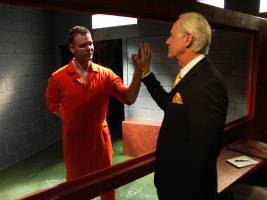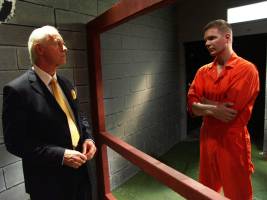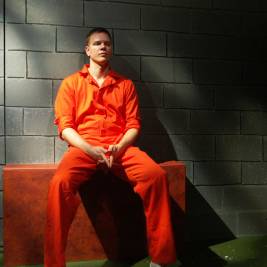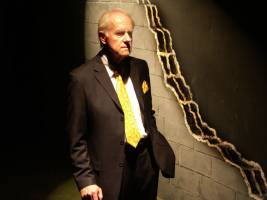
Imagine you were allowed to conduct a series of brief interviews with the man responsible for killing 168 Americans and injuring over 500 more in the then deadliest act of terrorism ever perpetrated on U.S. soil. Assuming you even wanted to talk to him, what would you say? What would you want to know?
This is the premise of Edmund White’s Terre Haute, the novelist-turned-playwright’s gripping 2006 one-act drama, now getting a superb Southern California Premiere at Hollywood’s The Blank Theatre Company.
Inspired by a series of articles which author/political activist Gore Vidal wrote about Timothy McVeigh after having exchanged several letters with the “Oklahoma City Bomber,” the award-winning writer imagines what might have happened if Vidal’s correspondence with McVeigh had led to an actual series of meetings only days before the convicted terrorist’s execution by lethal injection. What results is a riveting, eye-opening, profoundly moving play, directed with subtlety and force by Kirsten Sanderson and given a pair of bravura performances by Mike Farrell and Jim Parrack.
“Mike Farrell as Gore Vidal?” you may be asking yourself as I did when I first heard of the casting. M*A*S*H’s All American B.J. Hunnicutt as the elegant, effete, intellectual, homosexual Gore Vidal?
Rest assured. From his first moments as “James Brevoort” (Terre Haute’s very thinly veiled Vidal), Farrell will have you convinced, as will his brilliant costar in the role of “Harrison,” as White calls his stage version of McVeigh.
There may well be theatergoers reading this who are wondering whether a terrorist mass murderer is appropriate subject matter for a play, or who believe that McVeigh deserves no public forum to expound upon what propelled him to kill or wound so many of his fellow Americans—men, women, and children alike.
Rest assured here too. White does not paint a rosy picture of a killer, nor does he try to explain away “Harrison’s” action. What he does do, particularly in Parrack’s fully three-dimensional performance, is help us to understand this enigma—a Bronze Star-awarded Gulf War veteran and Green Beret hopeful who became obsessed with the belief that the Federal Government was the enemy of the people and that a group of men called the “New World Order” was out to take over the world.
In one of several speeches directly to the audience, James tells us his reasons for meeting with Harrison (“I want him to tell me all about the bombing. All the details. Something he hasn’t told anyone. I want him to like me.”), confessing to us that “There is something dangerous about meeting one’s pen-pal.” James finds himself impressed by Harrison’s honesty (“The only reason that could justify me killing so many people and losing my own life now is getting my message out. And you’re the only one who can do that.”) and his apparent sincerity (“All I care about is your words—what you’re going to say about me.”), and the older man finds himself falling under blue collar Harrison’s seductive spell (“Are all sociopaths so charming? So clever at appealing to an old man’s vanity?”).
Soon, however, the paranoia at the heart of Harrison’s actions begins to reveal itself, as when he describes “New World Order” as “the organization that’s made up of the FBI and the Earth First! terrorists and David Rockefeller and the other Marxist leaders on the Council of Foreign Relations.”
Playwright White allows us to see, hear, and at least partially understand this intelligent though woefully undereducated young man who allowed himself to be brainwashed by writings like The Turner Diaries, a novel James immediately categorizes as “racist White supremacist right wing garbage,” to which Harrison responds with a succinct, “It’s my favorite book.” Like James, we can’t help but wonder what kind of man Harrison might have become had he known the simple difference between a good book and a bad one.
White (and James) don’t let Harrison off lightly. In one of Terre Haute’s most powerful moments, James rails at Harrison, “I’m an atheist, and you’re not much of a believer, but all we have, each one of us, is our story. It’s the novel we’re writing by just existing, and you shredded all those lines and chapters and books, you burned the books of their lives in one big bonfire — and it wasn’t your right to do that!” Powerful stuff this.
Underlying the entire play is a sexual flirtation (one-sided as it may be) between an arthritic septuagenarian and a sexy 20something not too far removed from the type of young man James is in the habit of lusting after (“I see boys like you wandering around New York … Young, dumb, and full of come.”) and hiring to have sex with him. Some audience members may be uncomfortable with Terre Haute’s homoeroticism, while others may find themselves as alternately attracted and repelled as James seems to be.
Ultimately, though, Terre Haute seems less about finding a possible justification (or at least motivation) for Harrison/McVeigh’s actions than about exploring the importance of forging human connections, however frail, even when they are between two such opposite men as James and Harrison, even when touch is made impossible by an ever-present pane of bullet-proof glass.
Supporting himself on a cane, his body slightly stooped with osteoarthritis, Farrell transforms himself into James, and not just physically. He virtually disappears inside this suave, witty, haughty, fastidious, puffed-up, profoundly lonely man. The same can be said for Parrock’s Harrison, a handsome 6’4” (or thereabouts) hulk of a man, charming one minute and surly the next, a complex mix of intelligence, naiveté, bigotry, and sweetness. Both performances left me breathless.
M. Jennings Turner’s set design divides the Blank stage in half, only a pane of glass separating prisoner and visitor, surrounded by realistically painted stone walls. Warren Davis’s sound design too helps to situate us through its clanging doors in a Terre Haute federal penitentiary. Lighting designer Cameron Zetty casts appropriately harsh light on the interview scenes, then bathes James in a warmer spot when he speaks to the audience. Bethany Jane Bohatilla has designed James’s dark suit and Harrison’s prison uniform. Caitlin Eckstein is assistant director and stage manager.
Once again with Terre Haute, Daniel Henning and Noah Wylie’s The Blank Theatre establishes itself as one of Los Angeles’ finest. Spellbinding, thought-provoking, and deeply moving, Terre Haute is L.A. theater at its most exceptional.
The Blank 2nd Stage Theatre, 6500 Santa Monica Boulevard, Hollywood.
www.TheBlank.com
–Steven Stanley
October 14, 2010
Photos: Rick Baumgartner






 Since 2007, Steven Stanley's StageSceneLA.com has spotlighted the best in Southern California theater via reviews, interviews, and its annual StageSceneLA Scenies.
Since 2007, Steven Stanley's StageSceneLA.com has spotlighted the best in Southern California theater via reviews, interviews, and its annual StageSceneLA Scenies.







 COPYRIGHT 2024 STEVEN STANLEY :: DESIGN BY
COPYRIGHT 2024 STEVEN STANLEY :: DESIGN BY